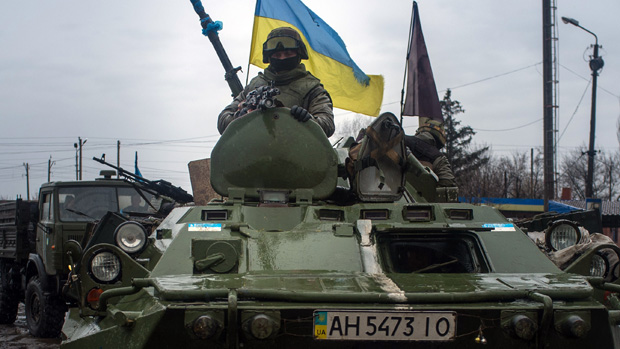How the Ukraine war might play out in 2023
Analysts believe winter may play a key role in determining outcome of conflict as Russian invasion falters

A free daily email with the biggest news stories of the day – and the best features from TheWeek.com
You are now subscribed
Your newsletter sign-up was successful
As 2023 approaches, some experts are predicting that the coming months will mark a turning point in the conflict between Russia and Ukraine.
Vladimir Putin’s troops have faced devastating defeats on the battlefields since the Russian president ordered the invasion of the neighbouring former Soviet state in February.
But the onset of winter may ultimately determine when and how the war will end – and which side will claim victory.
The Week
Escape your echo chamber. Get the facts behind the news, plus analysis from multiple perspectives.

Sign up for The Week's Free Newsletters
From our morning news briefing to a weekly Good News Newsletter, get the best of The Week delivered directly to your inbox.
From our morning news briefing to a weekly Good News Newsletter, get the best of The Week delivered directly to your inbox.
What will winter bring?
While temperatures drop across Europe, Russia will be focused on holding “as much territory as possible while preparing for next year’s campaign”, wrote former Australian Army major general Mick Ryan in an article for national broadcaster ABC.
Winter could prove to be “Kyiv’s greatest ally”, said Dr Jack Watling, a senior research fellow for land warfare at Royal United Services Institute, in The Telegraph. Despite widespread assumptions that “winter conditions will favour the Russian military”, he wrote, “living in a cold environment and fighting in one demand different skills, as Russia’s newly mobilised troops may be about to discover”.
Many of these troops have received “minimal training”, are “poorly equipped” and lack “personal discipline”, Watling continued. And a lack of junior leaders “who know when to withdraw people from the line to seek shelter, warm up and dry their equipment” is likely to result in “casualties through exposure, frostbite, and low morale”.
Yet there is more in Putin’s winter arsenal than just digging his troops into Ukrainian soil. The Russian president will also try to “leverage a cold winter and high energy prices to shape Western public opinion in the northern hemisphere and drive a European intervention that forces a ceasefire”, Ryan said on ABC.
A free daily email with the biggest news stories of the day – and the best features from TheWeek.com
But Putin's “gas warfare might galvanise Europe”, argued Professor Mike Bradshaw of the Warwick Business School in an article for London-based think-tank Chatham House.
“It is about autocracy against democracy,” warned European Commission President Ursula von der Leyen in her annual State of the EU address in September.
Leaders across the Continent are framing the energy stand-off with Russia as “an epic struggle between good and evil”, said The Telegraph. Putin’s refusal to supply gas to Europe “may also end up costing Russia” dearly in financial terms, hindering Moscow’s ability to fund the invasion, the paper added.
Is a peace deal on the horizon?
If the conflict continues to drag on, Putin will increasingly “struggle to train, equip and supply an army capable of occupying the four Ukrainian provinces he has annexed”, said The Economist’s deputy editor Edward Carr.
Western support remains vital for Kyiv to repel the invaders. Putin “calculated that the West would abandon Ukraine”, Carr wrote. “He has therefore tried to deal with battlefield reverses by cutting off gas supplies to Europe and warning of nuclear war.”
But “these threats have backfired”, by convincing Western governments that “humouring” the Russian leader “would be dangerous”.
On the other hand, Carr added, Russia’s “nuclear weapons mean that a surrender cannot be imposed on the Kremlin by force of arms”. Instead, the greatest hope of peace is for Russians to “grasp the truth” that Putin is “squandering their lives in a futile, unwinnable war”.
For his part, Putin said in late September that he was “still open to talks” with Ukraine. But Ukraine’s Volodymyr Zelenskyy countered that he would only be willing to negotiate “if another president comes to power”.
Ukraine’s chief negotiator, David Arakhamia, said last month that peace talks might start again in “the second half of 2023”, during the presidential race in Russia.
Repeated calls for talks to be held before then have been met in some quarters with “accusations of helping Putin”, said defence experts Rajan Menon and Daniel R. DePetris said in The Guardian. “But that’s misguided,” the duo arged.
“The notion that offering proposals for ending the war betrays Kyiv and aids Moscow is absurd. We need constructive discussions about diplomatic solutions.”
Arion McNicoll is a freelance writer at The Week Digital and was previously the UK website’s editor. He has also held senior editorial roles at CNN, The Times and The Sunday Times. Along with his writing work, he co-hosts “Today in History with The Retrospectors”, Rethink Audio’s flagship daily podcast, and is a regular panellist (and occasional stand-in host) on “The Week Unwrapped”. He is also a judge for The Publisher Podcast Awards.